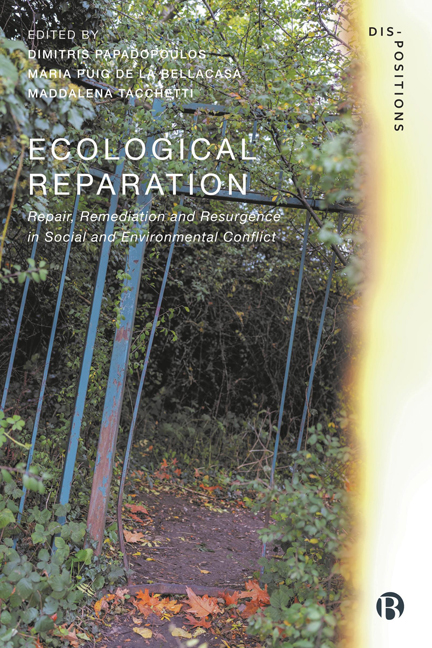Book contents
- Frontmatter
- Contents
- List of Figures
- Notes on Contributors
- Acknowledgements
- Note on the Figures
- Dis-Positions Series Preface
- Introduction: No Justice, No Ecological Peace: The Groundings of Ecological Reparation
- PART I Depletion<>Resurgence
- PART II Deskilling<>Experimenting
- PART III Contaminating<>Cohabiting
- PART IV Enclosing<>Reclaiming Land
- PART V Loss<>Recollecting
- PART VI Representing<>Self-governing
- PART VII Isolating<>Embodying
- PART VIII Growth<>Flourishing
- Index
Introduction: No Justice, No Ecological Peace: The Groundings of Ecological Reparation
Published online by Cambridge University Press: 28 March 2024
- Frontmatter
- Contents
- List of Figures
- Notes on Contributors
- Acknowledgements
- Note on the Figures
- Dis-Positions Series Preface
- Introduction: No Justice, No Ecological Peace: The Groundings of Ecological Reparation
- PART I Depletion<>Resurgence
- PART II Deskilling<>Experimenting
- PART III Contaminating<>Cohabiting
- PART IV Enclosing<>Reclaiming Land
- PART V Loss<>Recollecting
- PART VI Representing<>Self-governing
- PART VII Isolating<>Embodying
- PART VIII Growth<>Flourishing
- Index
Summary
Ecologies, repair, justice
There is an urgency to face the precipice of ecological devastation, take a leap into the fractures of a broken Earth, and experiment with more sustainable and just ways of living. And yet, in spite of incessant calls to attend to multiple fronts of emergency, major obstacles remain. One of them, as many analyses of the hope-shattering failures of COP26 and previous climate agreements have shown (Kutney, 2014; Rosen, 2015; Spash, 2016; Arora and Mishra, 2021), is the recognition of the inescapable entanglements of ecological care with care for people. No justice, no ecological peace. Attempting a modest contribution to efforts addressing this situation, Ecological Reparation engages with social-environmental degradation by trying to rethink concepts and practices that may be needed to repair and to remediate both damaged ecologies and persistent inequities in ways that support resurgence against more than human injustice. This book takes up this task from a diversity of theoretical and political fronts, unpacking some of the workings at stake in the conceptual coupling of the ecological with reparation.
The intellectual and political grounds upon which this book has grown are nurtured by a surge of thinking about new multifaceted and generative meanings for ecology. Encompassing traditional scientific meanings, fostering ‘the ecological’ has come to signify an embodied understanding of the highly specific and worldly environmental, socio-political and mental connections that situate different beings, human and non-human (Guattari, 1995) – or, perhaps, in more abstract conceptual undertakings, connections between multiple forms of matter and experience within interdependent environments (Hoerl and Burton, 2017; see also Kingsland, 2005; Herzogenrath, 2009; Morton, 2010; Wall, 2014; Papadopoulos, 2022). Exploring a sense of general ecology has promoted the decentring of the human and confronted human exceptionalism, yet increasingly too the revival of ecological thought has been challenged by perspectives that insist that all more than human affairs exist precariously and are marked by situated histories of social, gendered, racial, colonial and spatial conflicts (Nightingale, 2011; Wright, 2018). In other words, there is no such thing as a neutral ecology for people and nonhumans; ecological interventions pose issues of justice at their core, even when these are difficult to apprehend from where one stands (Plumwood, 2008).
- Type
- Chapter
- Information
- Ecological ReparationRepair, Remediation and Resurgence in Social and Environmental Conflict, pp. 1 - 16Publisher: Bristol University PressPrint publication year: 2023

